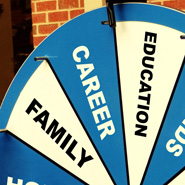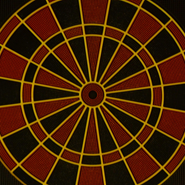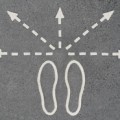So far in this series we’ve introduced goals and talked about exactly what goals are. Now I want to talk about why they work. If you understand why goals work it will help you understand how to use them; when to pursue them relentlessly and when to back off a little. Goals can be incredibly powerful but they aren’t for everyone and they can be counter-productive if you become too single minded about them.
There are a lot of easy answers to why goals work. Most of these aren’t very useful. For example:
- Goals provide motivation
- They focus your activity
- They give you direction
- They help you manage your time
These things are all kind of true, providing you’ve got a goal you’re actually enthusiastic about in the first place and you know how to use goals effectively. However, all of these statements are pretty vague and don’t really get to the important underlying reason why goals work.
Why Goals Work – It’s all about decisions
The real reason why goals work, and why they’re so useful, is this: They help you make decisions.
At any given time there are plenty of things you could be doing. If you’re working you probably have some kind of to do list, but are you tackling the easy but unimportant tasks, getting stuck in to the big daunting ones, checking email instead, making a cup of tea or maybe just procrastinating by reading a blog about goal setting? If you’re not working you still have a whole bundle of options available to you. Do you switch on the telly, make some food, check Facebook, practice your instrument, do some DIY, clean the kitchen, go to the pub, call a friend, etc., etc.?
With so many possibilities open to us, and a finite amount of time, how do we decide what to do? Well that’s where goals come in to their own. If you’ve set yourself a goal then you have a criteria to measure your options against. For any choice, ask yourself if it moves towards your goal. If it doesn’t, consider whether it is really the best thing for you to be doing. Ask yourself if there’s a different choice you could make that will help you achieve your goal faster.
This may sound deceptively simple, but it is the heart if the enormous power of goals. Without a goal every decision is equal. You make choices based on a whim. You don’t have a destination so it doesn’t matter if you never get anywhere. Once you have a goal then you have some sense of direction and you can use that to make decisions, choosing the options that you feel will get you where you want to go.
This doesn’t work for everyone
Hopefully that makes sense to you. It may also help you see why goals aren’t for everyone as I mentioned in the introduction to this series. Some people don’t want to micro-manage their life in this way. Some people like deciding things on a whim and being spontaneous. Goals probably aren’t such a useful tool for these people. That’s absolutely fine. Those people still achieve great things, produce great art, lead wonderful happy and productive lives. They just do it in a different way and that’s cool. Goals are a tool, not the one and only way everyone should structure their existence.
Health Warnings
One danger of goals is that it is possible to become obsessed. When you assess every decision against the goal and only chose options that move you towards it, no matter how hard it is and how tired you are, there’s a risk of burnout. There’s also the danger of neglecting other important aspects of your life. Many of us goal devotees have learnt this the hard way. Here are a few things to keep in mind if you’re going to pursue a goal in earnest.
– Downtime
 Sometimes the best thing you can do to achieve your goal is to relax. Watch some tv, spend some time with your loved ones, listen to music, go for a walk, have a night out, go on holiday.
Sometimes the best thing you can do to achieve your goal is to relax. Watch some tv, spend some time with your loved ones, listen to music, go for a walk, have a night out, go on holiday.
It’s very easy to feel you should be working on your goals every waking hour. If you are a very driven person you can end up working all the time and agonising over every ‘wasted’ minute where you’re not relentlessly pursuing your ambition. This isn’t healthy, mentally or physically. Sometimes you need to recharge. To stop for a while and relax. Spend time with people you care about.
If you drive yourself to exhaustion or illness you will have to take a long break from working towards your goals while you recover. Better to take lots of short breaks along the way doing stuff you enjoy and seeing people you like rather than laying up in bed for a week under doctors orders because you’ve burnt out.
Personal relationships are important too, something that very goal driven people can overlook. Family, friends and loved ones are important and often provide the foundation of our mental and emotional strength and stability. Don’t neglect that because you’ve become single mindedly focused on a goal. Time spent on these relationships is time well spent both for your well being and for your overall progress towards your goal.
– Chores
Ok, so we’re now ultra-disciplined, super motivated people and every action is now working toward our goal or recharging our batteries so we can get back to it, right? Well no. Real life gets in the way. We still have to put the bins out, feed ourselves, fill in our finances, shower from time to time and all those other pesky mundanities which get in the way of all the good stuff in life.
Take my advice, just accept it. There’s a whole bunch of stuff we’ve just got to do which takes up our time but doesn’t give us any great reward. It’s frustrating, but the sooner you accept it and get on with it the easier it will be.
Don’t neglect this stuff either. Unless your goal is to live the life of a hermit in the wilderness with no human contact then nutrituion, cleanliness and hygiene are important to keep you healthy and make sure other people don’t shun you!
With that said, there’s nothing to stop you from finding ways to make chores quicker and easier. Get a dishwasher, hire a cleaner if you can afford it, shop online if it’s faster. These things have to be done but if you can get them done more efficiently to free you up to work on your goals then go for it.
– Morality
This is a tricky one, and I don’t intend to lecture anyone in right and wrong. Just be aware that sometimes the pursuit of a goal might lead us to consider actions that we’re not comfortable with morally. Should you screw someone over to get the job opportunity you’ve always wanted? Should you lie to get the gig? Should you hire a hitman to take out the competition?
I’m not going to tell you what to do, just remember that your goal may help you make a decision but it does not override every other consideration. If you consider a course of action and your conscience prickles, stop for a moment and ask yourself if that’s really what you want to do. Do you want to be the kind of person who does that? Maybe you’re OK with that, in which case go for it. But maybe not. Maybe you think the goal is still important, but you’re not going to achieve it that way. You’ll find a different way which is more consistent with your own sense of right and wrong.
So that’s just something to keep in mind. Goals are useful tools, but they don’t give you license to ride roughshod over everyone and everything. The ‘achieve your goal no matter the cost’ school of thought is unpleasant, unhelpful and unlikely to make you happy even if you get where you wanted to in the long run.
In summary, goals work because they help you make decisions. They help you evaluate the options available to you using the criteria ‘will this help me achieve my goal?’ They help you decide what to do with your time and just as importantly what not to do with your time. They help you decide whose opinions you need to worry about and whose you can ignore, where to spend your energy and resources and where not to. This is their power.
Next time, how to set your own goals.






Pingback: Setting Goals 2 - What are goals? - Matt Helm Guitar